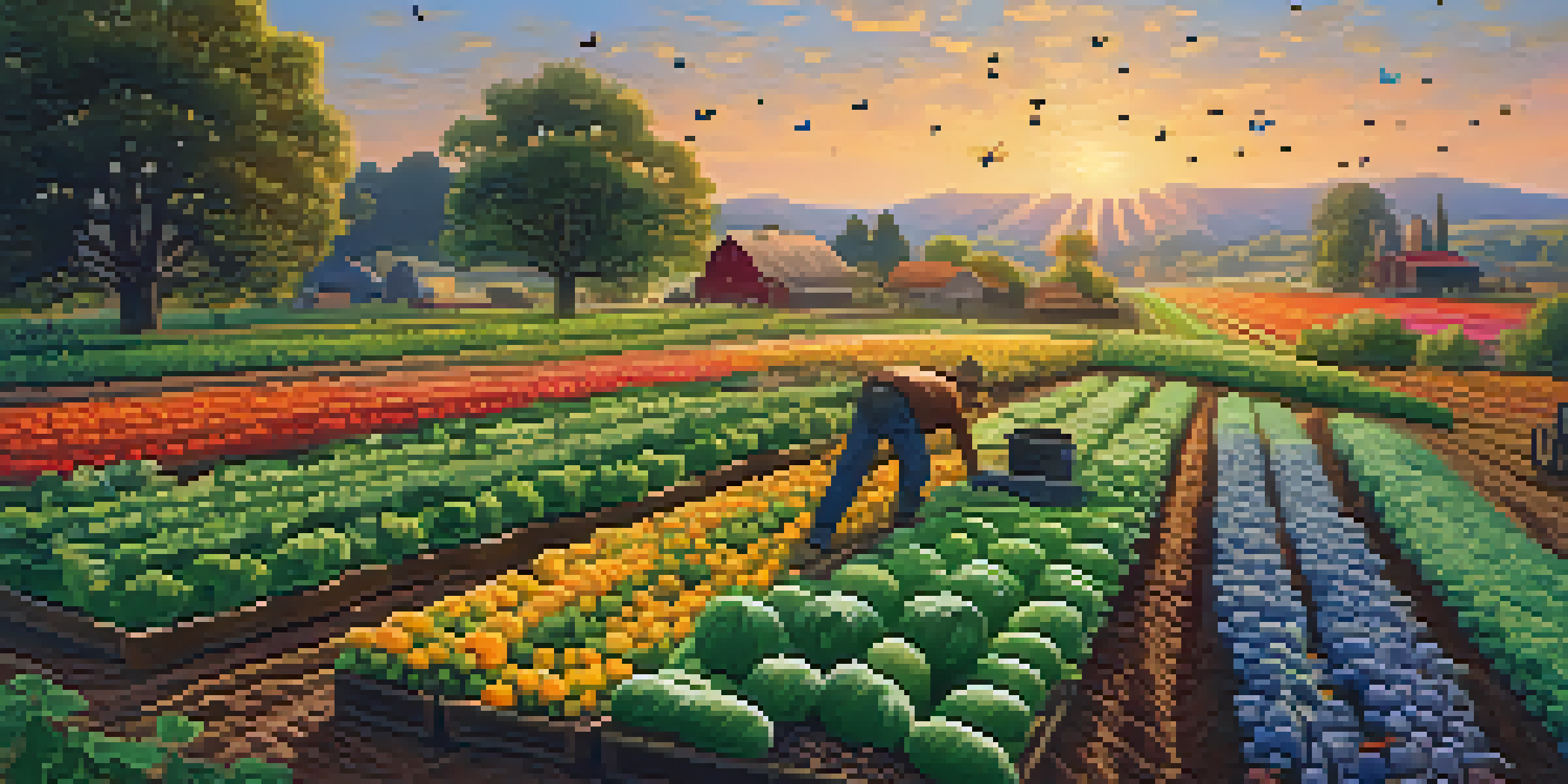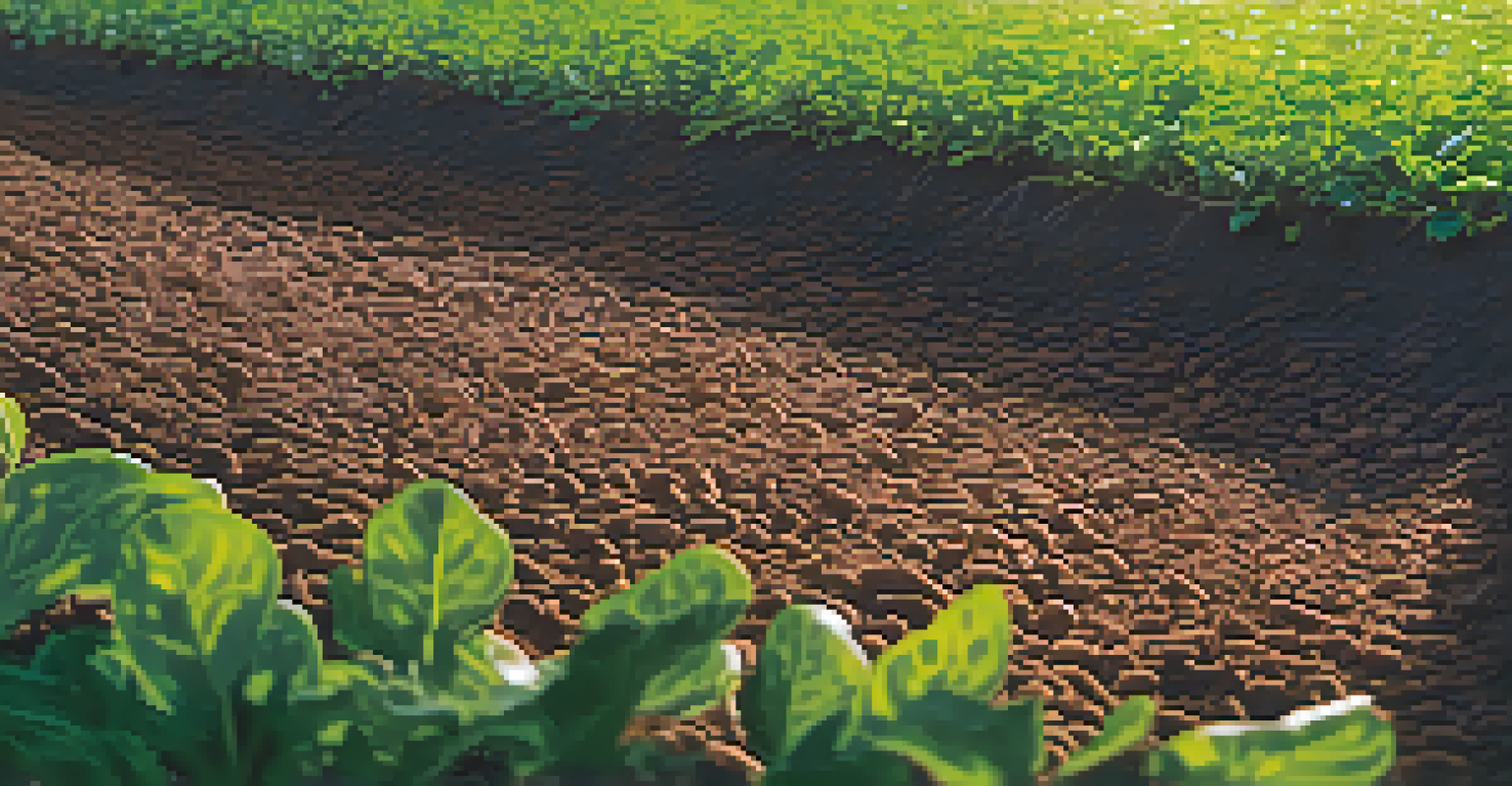Sustainable Practices in Organic Food Plant Farming

Understanding Organic Farming: A Sustainable Approach
Organic farming is a method that focuses on growing food without synthetic fertilizers or pesticides. Instead, it emphasizes the use of natural processes and materials, promoting biodiversity and soil health. This approach not only yields healthier crops but also contributes to a more sustainable ecosystem.
The health of our soil is fundamental to the health of our food and the health of our planet.
At its core, organic farming aims to work in harmony with nature rather than against it. Farmers often use crop rotation, cover crops, and composting to enhance soil fertility and control pests. This not only reduces reliance on chemical inputs but also fosters a more resilient agricultural system.
By prioritizing sustainable practices, organic farmers help mitigate the negative impacts of conventional farming, such as soil degradation and water pollution. As more consumers become aware of these benefits, the demand for organic products continues to rise, encouraging further adoption of sustainable practices.
Soil Health: The Foundation of Sustainable Farming
Healthy soil is crucial for successful organic farming. It acts as a living ecosystem, supporting plant growth and providing essential nutrients. Practices like composting and using cover crops enhance soil structure and fertility, promoting a thriving environment for crops.

In organic farming, minimizing soil disturbance is key. Techniques such as no-till farming help preserve soil integrity, reducing erosion and maintaining moisture levels. This approach also encourages beneficial microorganisms to flourish, which play a vital role in nutrient cycling.
Organic Farming Supports Ecosystems
By using natural processes and materials, organic farming promotes biodiversity and enhances soil health, creating a sustainable agricultural system.
Investing in soil health is not just beneficial for the crops; it's a long-term strategy for sustainability. Healthy soil can sequester carbon, helping to combat climate change, while also supporting water retention and reducing the need for irrigation. This creates a win-win scenario for farmers and the environment.
Crop Rotation: Enhancing Diversity and Resilience
Crop rotation is a traditional practice that involves planting different crops in a specific sequence over time. This method prevents soil nutrient depletion and disrupts pest and disease cycles. By alternating crops, farmers can improve soil health and increase biodiversity on their farms.
Sustainable agriculture is a way of farming that is efficient, profitable, and environmentally friendly.
For instance, rotating legumes with other crops can naturally replenish nitrogen levels in the soil, reducing the need for synthetic fertilizers. This not only enhances soil fertility but also promotes a balanced ecosystem, benefiting both plants and beneficial insects.
Moreover, diverse crop systems are generally more resilient to climate fluctuations and pests. When farmers implement crop rotation, they create a more adaptable farming system that can withstand challenges, ensuring a sustainable food supply for the future.
Integrated Pest Management: Nature's Allies
Integrated Pest Management (IPM) is a sustainable approach that combines various strategies to manage pests effectively while minimizing harm to the environment. Instead of relying solely on chemical pesticides, IPM emphasizes preventive measures and the use of natural predators. This not only protects crops but also fosters a healthier ecosystem.
For example, introducing beneficial insects, like ladybugs, can help control aphid populations without the need for harmful chemicals. Additionally, practices such as crop diversity and habitat management can create environments where natural predators thrive, further reducing pest pressure.
Soil Health Drives Sustainability
Healthy soil is essential for successful organic farming, supporting nutrient cycling and helping combat climate change through carbon sequestration.
By adopting IPM, organic farmers can maintain healthy crops while protecting biodiversity. This holistic approach not only benefits agricultural productivity but also supports a sustainable farming future.
Water Conservation: Efficient Use of Resources
Water conservation is critical in organic farming, especially in regions facing water scarcity. Implementing techniques such as drip irrigation and rainwater harvesting can significantly reduce water usage while ensuring that crops receive adequate moisture. These practices promote sustainability and help farmers adapt to changing climate conditions.
Drip irrigation, for instance, delivers water directly to the plant roots, minimizing evaporation and runoff. This targeted approach not only conserves water but also encourages deeper root growth, leading to healthier plants. Similarly, capturing rainwater can provide a valuable resource during dry spells.
By prioritizing water efficiency, organic farmers can reduce their environmental footprint and enhance the resilience of their farming systems. This commitment to conservation not only benefits the crops but also supports local ecosystems and communities.
Biodiversity: A Key Component of Sustainable Farming
Biodiversity plays a vital role in sustainable organic farming. By promoting a variety of plants and animals on the farm, farmers can enhance ecosystem services, such as pollination and pest control. This diversity contributes to a more resilient agricultural system that can better withstand environmental challenges.
For example, planting a mix of crops can attract beneficial insects, which help control pest populations naturally. Additionally, maintaining natural habitats, like hedgerows or wildflower patches, can support local wildlife and enhance overall farm productivity.
Community Engagement Boosts Local Farms
Connecting with local consumers through initiatives like farmers' markets fosters understanding of organic practices and strengthens the local economy.
Encouraging biodiversity not only benefits farm health but also creates a more balanced ecosystem. This interconnectedness fosters sustainability, ensuring that organic farming practices can thrive for generations to come.
Community Engagement: Supporting Local Agriculture
Community engagement is an essential aspect of sustainable organic farming. By connecting with local consumers and promoting community-supported agriculture (CSA) programs, farmers can create a strong support system for their practices. This not only helps sustain local economies but also fosters a deeper understanding of organic farming benefits.
For instance, participating in farmers' markets allows organic farmers to share their stories and educate consumers about their sustainable practices. This direct connection can lead to increased consumer demand for organic products, encouraging more farmers to adopt sustainable methods.

By building relationships within the community, organic farmers can create a more sustainable food system. This collective effort helps promote environmental stewardship and supports a healthier, more resilient local economy.
The Future of Sustainable Organic Farming
The future of sustainable organic farming looks promising, driven by increasing consumer awareness and demand for healthy, eco-friendly food. As more farmers adopt sustainable practices, we can expect to see a shift towards more resilient agricultural systems that prioritize environmental health.
Innovations in technology, such as precision farming and sustainable pest control methods, will continue to enhance the efficiency and effectiveness of organic farming. These advancements will help farmers optimize resource use while minimizing their environmental impact.
Ultimately, sustainable organic farming represents a holistic approach to food production that benefits both people and the planet. By embracing these practices, we can cultivate a healthier future for ourselves and generations to come.